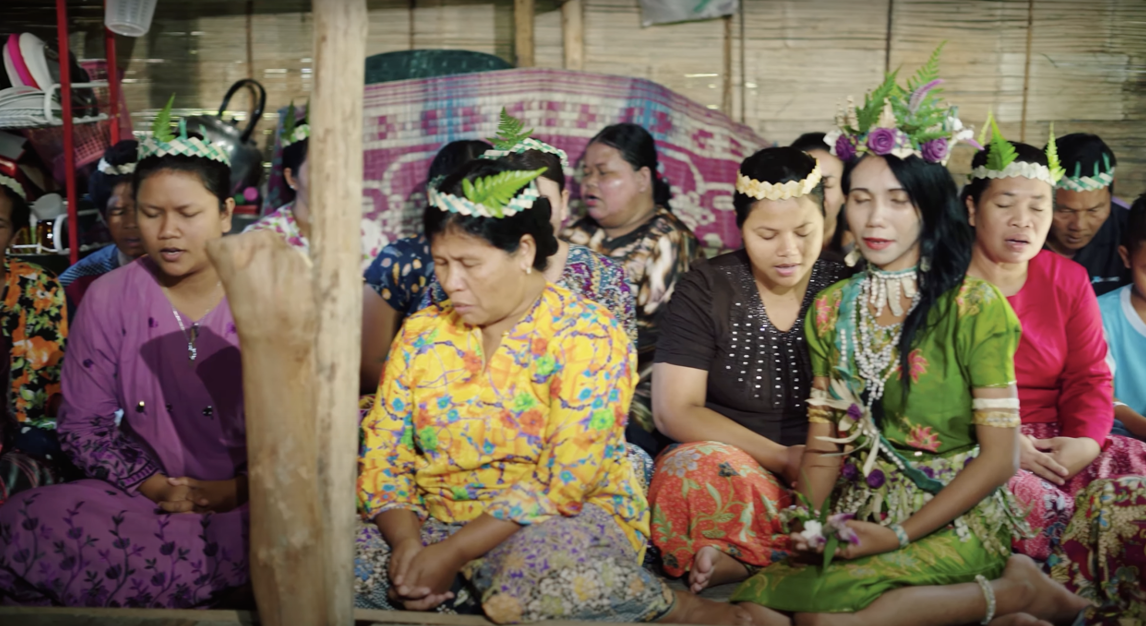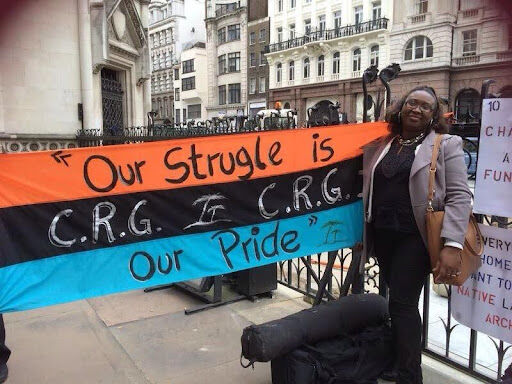The 53rd Session of the Human Rights Council
19th June – 14th July 2023
Agenda Item 9: Racism, racial discrimination, xenophobia and related forms of intolerance: follow-up to and implementation of the Durban Declaration and Programme of Action
11th July 2023

By Maria Antonia Pulido / GICJ
Executive Summary
The OHCHR report on the two-year comprehensive communication strategy for racial equality was presented during the 53rd session of the Human Rights Council on the 11th of July 2023 by Deputy High Commissioner for Human Rights, Nada Al-Nashif. The report aimed to address the pervasive issue of racism, compounded by intersectional factors of discrimination on various grounds. Drawing inspiration from the principles enshrined in the Universal Declaration of Human Rights and international treaties, including the International Convention on the Elimination of All Forms of Racial Discrimination (ICERD) and the Durban Declaration and Programme of Action (DDPA), the OHCHR report seeks to pave the way for a more equitable world.
The report highlighted the urgency of addressing racism and racial intolerance, which continue to afflict millions of individuals globally. Discrimination based on race, ethnicity, and other identities remains deeply entrenched, underscoring the need for collective efforts by the international community.
To combat racial discrimination and raise awareness on the subject, the OHCHR launched the "Learn, Speak Up, and Act!" (LSA) campaign in 2022. This initiative seeks to enhance public knowledge and mobilise global public support for racial equality. The campaign utilises various tools, such as web pages, videos, and social media content, to disseminate information effectively and inspire meaningful action to combat racism.
During the discussion, High Commissioner Nada Al-Nashif emphasised the campaign's significant strides, including millions of interactions with its content and substantial engagement on social media platforms. The LSA campaign has served as a powerful platform to raise awareness, challenge stereotypes, and advocate for tangible measures against racism and discrimination.
However, she also stressed that the campaign alone is not enough to address the deep-rooted systemic issues of racism. The OHCHR report underscored the pressing need for "greater promotion and outreach efforts to foster truly vigorous and decisive change." This entails that in alignment with the DDPA there must be concrete actions for reparatory justice for victims of racism, securing a sustainable development and strengthening education and awareness-raising campaigns that call for a transformation of attitudes and societal norms.
The OHCHR report called upon member states to demonstrate unwavering commitment and proactive efforts in the fight against racism, racial discrimination, xenophobia, and related intolerance. Deputy High Commissioner Al-Nashif urged states to accelerate progress rather than slow down and to translate rhetorical promises into tangible realities for victims of discrimination.
Geneva International Centre for Justice (GICJ) welcomes and commends the OHCHR's efforts in combating discrimination and racial intolerance on a global scale. GICJ firmly believes that the collective commitment of member states and their active support for the OHCHR's initiatives are pivotal in achieving meaningful progress in addressing racism and upholding human rights equally, for all.
As we move forward, the call to action is clear - collaborative efforts, proactive measures, and greater promotion of racial equality are essential to combating racism and discrimination effectively. By uniting in this common cause, we can create a world where the inherent dignity and rights of every individual, regardless of their race or ethnicity, are respected and upheld. GICJ urges the OHCHR to continue funding and delivering strategies to fight against racism, and we urge member states to join this transformative journey towards a more just and inclusive society. With the OHCHR report serving as a comprehensive blueprint for action, we have the opportunity to pave the way for a future built on principles of tolerance, diversity, and equality for all.
Background
The promotion of non-discrimination policies globally has been a long-standing goal in international law. However, it was the World Conference against Racism, Racial Discrimination, Xenophobia and Related Intolerance, held in Durban, South Africa in 2001, that marked a significant milestone. During this conference, negotiators successfully formulated the Durban Declaration and Programme of Action (DDPA), which represents a political commitment to strengthen policies and implement concrete measures to combat racial discrimination. This groundbreaking agreement set a precedent for an anti-discrimination agenda that required collective efforts from the international community.
Despite these international endeavours and the agreements in place, racism, xenophobia, and related intolerances continue to negatively impact the lives of millions of people worldwide. These issues persist as a consequence of the ongoing perpetuation of systemic racism.
In response to the ongoing challenges in 2021, the Human Rights Council, during its 48th Session, adopted resolution 48/18. This resolution called upon the Advisory Committee to conduct a comprehensive study examining the patterns, policies, and processes contributing to incidents of racial discrimination. The study was expected to propose measures aimed at advancing racial justice and equality.
Similarly, in 2022, during the 51st Human Rights Council Session, resolution 51/32 was adopted under the title "From Rhetoric to Reality: A Global Call for Concrete Action against Racism, Racial Discrimination, Xenophobia, and Related Intolerance." The primary objective of this resolution was to recognise the significance of the DDPA as a call to action. In pursuit of this goal and to effectively combat all forms of discrimination, the resolution urged the United Nations to enhance its efforts and allocate additional resources, including awareness-raising campaigns that promote messages of equality. Moreover, it sought to strengthen mechanisms for combating racism.
Building upon the principles outlined in the Universal Declaration of Human Rights and the international agreements mentioned above, the Office of the High Commissioner for Human Rights (OHCHR) initiated a campaign, as described in their report presented during the Human Rights Council's 53rd Session.
Report of the Office of High Commissioner for Human Rights
During the 53rd session of the Human Rights Council on the 11th of July 2023, the Office of the High Commissioner for Human Rights (OHCHR) presented its report titled "The Progress on the Two-Year Comprehensive Communications Strategy on Racial Equality." This report underscored the persistent challenges of racism, racial discrimination, hate speech, targeted violence, xenophobia, and related intolerance experienced by individuals globally, including Africans and people of African descent, Asians and people of Asian descent, indigenous peoples, migrants, refugees, and ethnic, racial, religious, and linguistic minorities. The pressing need to address these aggravated forms of discrimination highlights the significance of working collaboratively and implementing a two-year comprehensive communication strategy to raise awareness and mobilise global public support for racial equality, particularly with regard to the DDPA. The report aimed to offer an overview of the Learn, Speak Up, and Act! (LSA) campaign launched by the OHCHR on the 18th of July 2022. This campaign aims to increase awareness about racial equality and combat racism, racial discrimination, xenophobia, and related intolerance through various communication activities and products.
In alignment with the High Commissioner's Agenda for transformative change for racial justice and equality, which includes actionable recommendations to combat systemic racism, the report outlined the diverse communication products and activities created by the OHCHR for the LSA Campaign. Additionally, it provided suggestions for future efforts to raise awareness and garner public support for racial equality beyond the campaign period.
The communication products developed by OHCHR encompass publications, videos, web pages, social media content, public information, and media products. These materials aim to "promote equality, encourage discussions, and publicise ways of promoting and protecting fundamental human rights at all levels of society." To structure the campaign, the OHCHR formulated three key messages: "Education is a tool to fight racism," "Actions speak as loud as words," and "We are all agents of change." These messages emphasise the importance of learning from the history of racism, racial discrimination, and related intolerance to effectively combat them and, ultimately, take action to eliminate all forms of intolerance.
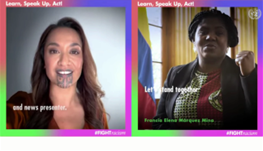
To ensure accessibility, the content of the campaign was translated into the six official United Nations languages. Visual content was regularly distributed and presented through the OHCHR field presences and regional and local networks. The campaign also adopted a youth-friendly approach, incorporating interactive educational experiences such as e-tools with summaries of ICERD, the DDPA, and the Decade for People of African Descent. The report highlighted various products, including videos, which were published on platforms like YouTube, Tiktok, Facebook, Twitter, and Instagram. These videos cover critical topics such as challenging stereotypes, interviews with anti-racism activists, discrimination and invisibility of indigenous peoples, and mechanisms to combat racism. Additionally, the OHCHR conducted educational video projects focused on microaggressions towards people of African descent, recording workshops on racism, racial discrimination, xenophobia, and related intolerance.
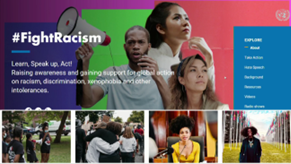
In terms of digital presence, the OHCHR established a landing page for the LSA Campaign, enhancing accessibility and visibility of core anti-racism and discrimination instruments. This page provides a comprehensive overview of the fight against racism and discrimination, showcasing the efforts of the United Nations human rights mechanism and the OHCHR itself. The report highlighted the website's improved cohesiveness and user-friendliness, with links to activities, agendas, and fellowship programs, promoting audience engagement and encouraging concrete actions in their respective contexts. This effort proved successful, with an additional 20,600 page visits recorded, with sub-pages such as Hate Speech and Take Action being the most popular, engaging over half of the web visitors. Social media also played a crucial role in the campaign's success, with over two hundred LSA Campaign social media posts on Twitter, Facebook, Instagram, Tiktok, and LinkedIn amassing over two million impressions. In line with Human Rights Council resolution 48/18, the OHCHR recruited a social media researcher to conduct a study on social media's role in racism, racial discrimination, xenophobia, and related intolerance. The resulting report titled "Social Media Racism: How Social Networks Challenge the Global Fight against Racism" provided insights into the trends of social media racism and the challenges posed by posts that exacerbate existing inequalities and incite hatred and discrimination.
Strategic partnerships have proven vital in enhancing the LSA Campaign's outreach efforts. OHCHR collaborated with the Department of Global Communications (DGC), UN Information Centers (UNICs), and OHCHR field presences to disseminate campaign information widely. The campaign also engaged with universities, schools, human rights champions, influencers, and civil society organisations to broaden its reach and impact. Partnerships with entities like the Permanent Forum on People of African Descent further enhanced the campaign's visibility and effectiveness.
Overall, the LSA Campaign has successfully initiated a global call to action against racism and discrimination. Its communication content effectively engages audiences, inspiring further exploration of relevant UN anti-discrimination instruments and mandates. Nonetheless, the report highlighted the challenges that persist in content visibility due to algorithmic issues on certain social media platforms. To address this, the OHCHR will explore diverse content strategies and strengthen engagement with social media platforms. Strategic partnerships will remain crucial in human rights outreach, and the campaign will intensify collaboration with field presences, universities, schools, and stakeholders, adapting activities to local contexts. Regarding publications, OHCHR will enhance social media activities, incorporating recommendations from the Social Media Racism research report. Lastly, the report emphasised that long-term funding support will be beneficial for sustaining and enhancing the campaign's outreach efforts, considering the high demand for the campaign's initiatives.
Presentation of the OHCHRC’s Report
On the 11th of July 2023, during the 53rd session of the Human Rights Council, Nada Al-Nashif, the Deputy High Commissioner for Human Rights, delivered a presentation on the OHCHR's report concerning the two-year comprehensive communication strategy for racial equality. In her address to the States, she emphasised the urgent necessity to confront racism, racial discrimination, xenophobia, and related intolerance. Al-Nashif pointed out that despite the fundamental principle that "all human beings are born free and equal in dignity and rights," numerous individuals continue to endure the deeply ingrained issues compounded by intersecting forms of discrimination.
The Deputy High Commissioner reminded the States about the International Convention on the Elimination of All Forms of Racial Discrimination (ICERD), which came into force in 1969. However, she expressed concern that universal ratification of this critical human rights treaty has not been achieved, and that eight United Nations human rights mechanism recommendations, based on the legal obligations of states, remain unimplemented.
In response to the aforementioned challenges, the Deputy High Commissioner presented the Learn, Speak Up, Act! (LSA) Campaign, which is part of the broader Fight Racism Campaign. This initiative is a direct outcome of the alarming lack of awareness about key instruments and initiatives for racial justice and equality. The LSA Campaign aims to bolster public advocacy, raise awareness, encourage action, and drive transformative change in combating systemic racism and human rights violations, particularly against Africans, people of African descent, and victims of racial discrimination.
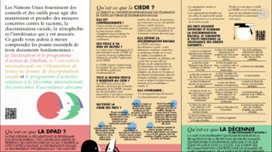 The focus of the campaign centres on United Nations instruments available to combat racism, including the DDPA, the ICERD, and the Decade for People of African Descent. By promoting these instruments, the LSA Campaign seeks to achieve racial equity by educating people about the historical legacy of racism, understanding contemporary tools to combat racism, and advocating for individuals to speak out against racism and take tangible actions.
The focus of the campaign centres on United Nations instruments available to combat racism, including the DDPA, the ICERD, and the Decade for People of African Descent. By promoting these instruments, the LSA Campaign seeks to achieve racial equity by educating people about the historical legacy of racism, understanding contemporary tools to combat racism, and advocating for individuals to speak out against racism and take tangible actions.
The Deputy High Commissioner highlighted the OHCHR's efforts in developing campaign products, such as web pages, videos, printed materials, e-tools, and youth-friendly social media content. These products have been translated and disseminated across various platforms to encourage engagement and inspire action. She stressed the campaign’s emphasis on reaching young audiences to foster greater interest in the fight against racism. Further, she celebrated the dedicated resources to amped up outreach through interactive media digital technologies, partnerships, cinematography and collaborations with celebrities who amplify the campaign’s objective and messages contributing to millions of interactions with the campaign's content.
However, Al-Nashif reminded the States that the campaign alone is not enough. She stressed the need for robust promotion and outreach efforts to translate rhetorical promises into tangible realities for victims of discrimination. Effectively eradicating racism, racial discrimination, xenophobia, and related intolerance requires "vigorous and decisive change;" therefore, she recommended the integration of specialised staff dedicated to managing outreach campaigns focused on racism and allocating sufficient financial resources to ensure the campaign's targeted impact. Al-Nashif appealed for collaboration from member States to extend the campaign's reach and bring about significant change in the fight against racism.
Position of Geneva International Centre for Justice (GICJ)
Geneva International Centre for Justice (GICJ) wholeheartedly commends the efforts and valuable contributions of the OHCHR in working to combat discrimination and racial intolerance on a global scale. However, GICJ believes that those states with significant resources and influence must do much more to ensure real equality and equity within their own territories and extend their support to address these issues elsewhere in the world.
GICJ firmly believes that the collective commitment of member States, coupled with their active participation in supporting the OHCHR's initiatives, is of paramount importance in achieving substantial progress in addressing racism and upholding human rights for all. It is through this collective determination that we can pave the way for a more just and equitable world.
Subsequently, GICJ advocates for States to take resolute action and implement comprehensive legislative frameworks in strict adherence to the principles set forth in the Durban Declaration and Programme of Action. These frameworks are critical to breaking the chains of systemic racism and ensuring that the insidious perpetuation of discrimination comes to an end. The commitment of states to enact and enforce robust laws that protect against all forms of racial discrimination is crucial in advancing the cause of racial equality.
The participation of States in expanding the OHCHR's Learn, Speak Up, Act! (LSA) Campaign within their respective countries is a pivotal step towards achieving racial equity. GICJ actively supports the involvement of states in fostering collaboration and partnership with the OHCHR to amplify the impact of this vital campaign. By joining hands, states can collectively work towards dismantling the barriers that perpetuate racial inequality and promoting a society built on the principles of tolerance, diversity, and respect for all.
GICJ firmly believes that eradicating racism and discrimination necessitates a comprehensive and concerted effort that transcends borders and unites nations. The Durban Declaration calls upon member states to not only adopt legislation but also to actively implement measures that combat racial discrimination in all its forms. By embracing diversity and upholding human rights, nations can cultivate an environment where all individuals, regardless of their racial or ethnic background, can thrive and live free from prejudice and injustice. States with resources must play a leading role in driving these efforts, both domestically and internationally, to create a more equitable and just world for all.
HRC53rd, Human Rights Violations, HumanRights, Fight Against Racism, Geneva4justice, GICJ, Human Rights Council, Regular Session, Justice, Learn Speak Up Act!, StopRacism, OHCHR, DDPA




